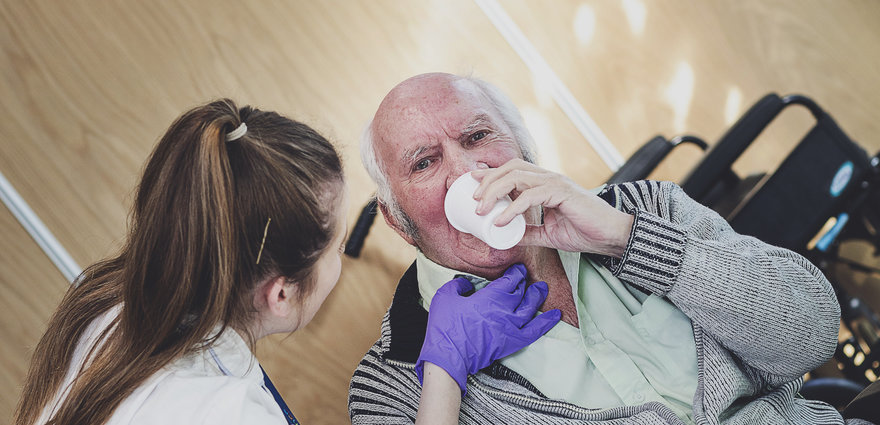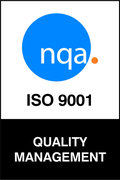
Swallowing Referrals
Problems with swallowing are often referred to as ‘dysphagia’.
We accept referrals for people who have dysphagia at the level of their mouth (oral) or throat (pharyngeal) who need a specialist assessment of their swallowing.
People with dysphagia may have problems with storing food or drink in their mouth, losing food or drink out of their mouth, coughing or choking when eating or drinking, a wet voice or increased shortness of breath when eating and drinking.
The risks of a swallowing problem include dehydration, malnutrition, weight loss, choking and aspiration (breathing in food or drink). Aspiration can lead to chest infections and pneumonia.
Some patients who have difficulties and a low level of risk can be managed by their care home and do not require an SLT Assessment (RCSLT, 2018) as reflected in their model https://www.rcslt.org/wp-content/uploads/media/Project/RCSLT/dysphagia-in-care-homes.pdf
Identification, Screening & Assessment
If care home staff observe a patient having swallowing problems, they should:
- Communicate it to the team and document their concerns
- Consider a GP review
- implement feeding safely routines to see if this remediates the issue.
- Implement monitoring forms to include coughing monitoring charts, food and fluid intake charts & ensure they have up to date weight and MUST scores.
- Follow the advice for the identified problem as outlined below:
Choking Episodes
Choking happens when someone's airway suddenly gets blocked, either fully or partly, so they can't breathe or breathe properly. They will have needed assistance to clear.
If there are any other signs of swallowing problems e.g. coughing on food/ drink at other times, pouching, chest infections, please submit an SLT referral and whilst waiting for assessment:
- Ensure supervision with all food
- Ensure staff follow feeding safely routines and risk assessments/ care plans updated.
- Implement coughing monitoring charts
- Weigh the patient and calculate their MUST score – Follow the Food First approach and consider dietetic referral if this is indicated.
- Whilst waiting for SLT consider the least restrictive diet modification – see the level 3 - 7 diet sheets available on this page. Ensure mental capacity act legislation is followed and the relevant documentation is updated.
Is it a one-off choking episode with no other signs of swallowing problems or are you unsure if they have any other problems? In this case:
- Provide supervision with all meals
- Follow feeding safely routines and provide support at mealtimes to chop up food/ slow down rate of eating if needed. Click here for more information
- Implement coughing monitoring charts and monitor over next week. If no other swallowing issues noted and problems resolved by your action, then SLT referral likely not needed. Update your care plan to include any support needed going forward e.g. supervision, cutting up food etc
If other problems are seen, please submit an SLT referral along with the completed coughing monitoring charts.
Coughing on Food
Please submit an SLT referral ASAP if the patient is coughing on food and has repeated chest infections, coughing at all meal times, or regularly coughing resulting in at least one choking episode requiring assistance. Whilst waiting for assessment:
- Ensure supervision with all food
- Ensure staff follow feeding safely routines and risk assessments/ care plans updated.
- Implement coughing monitoring charts
- Weigh the patient and calculate their MUST score – Follow the Food First approach and consider dietetic referral if this is indicated.
- Whilst waiting for SLT consider the least restrictive diet modification – see the level 3 - 7 diet sheets available on this page. Ensure mental capacity act legislation is followed and the relevant documentation is updated.
For all other concerns complete steps 1-4:
- Review charts. If the problem is resolved by feeding safely routines, ensure care plans reflect this. SLT assessment is not needed in this case.
- Check that coughing is related to eating and drinking. If not, then arrange GP review as SLT input likely not needed.
- If ongoing issues refer to SLT, sending copies of monitoring charts and up to date weight and MUST score.
- Whilst waiting for SLT consider the least restrictive diet modification – see the level 3 - 7 diet sheets available on this page. Ensure mental capacity act legislation is followed and the relevant documentation is updated.
Coughing on Drinks
Please submit an SLT referral ASAP if the patient has had repeated chest infections or an ongoing chest infection, if they are coughing on most sips of drinks, if they are coughing on drinks and are routinely taking in less than 1 litre of fluid a day, or they get repeated urine infections. Whilst waiting:
- Ensure fluid charts and coughing monitoring charts in place
- Implement feeding safely routines
For all other concerns ensure steps 1 and 2 are followed:
- Complete coughing monitoring charts for a minimum of 3 days and review.
- If problems are resolved with feeding safely routines and there are no fluid intake concerns, update the care plan and continue to monitor. If not resolved, please submit an SLT referral with copies of coughing monitoring charts, details of fluid intake and an up to date weight/MUST score.
Recurrent Chest Infections
- Speak with GP about whether infections could be aspiration related. Monitor eating and drinking at mealtimes using charts.
- Consider oral hygiene, the need for a dental review and whether the patient could have reflux. These can all be causal factors in pneumonia.
If any evident signs of swallowing problems e.g. coughing on food/ fluids, shortness of breath when eating/ drinking, wet voice etc, please complete SLT referral ASAP. Whilst waiting for assessment:
- Ensure supervision with all food
- Ensure staff follow feeding safely routines and risk assessments/ care plans updated.
- Implement coughing monitoring charts
- Weigh the patient and calculate their MUST score – Follow the Food First approach and consider dietetic referral if this is indicated.
- Whilst waiting for SLT consider the least restrictive diet modification – see the level 3 - 7 diet sheets available on this page. Ensure mental capacity act legislation is followed and the relevant documentation is updated.
Pouching on Food/Drink
Please complete an SLT referral if the patient has repeated chest infections or an ongoing chest infection. Whilst waiting for us to assess:
- Ensure supervision with all food
- Ensure staff follow feeding safely routines and risk assessments/ care plans updated.
- Implement coughing monitoring charts
- Weigh the patient and calculate their MUST score – Follow the Food First approach and consider dietetic referral if this is indicated.
- Whilst waiting for SLT consider the least restrictive diet modification – see the level 3 - 7 diet sheets available on this page. Ensure mental capacity act legislation is followed and the relevant documentation is updated.
For all other cases:
- Medical review to determine any medical reason e.g. oral infections, reflux, constipation which could be impacting on eating /drinking.
- Implement coughing monitoring charts. Any coughing/ choking – please submit an SLT referral.
- Ensure staff following feeding safely routines and giving prompting/ assistance with feeding.
- Weigh the patient and calculate their MUST score – Follow the Food First approach and consider dietetic referral if this is indicated. If taking liquids better ensure being offered nutritious drinks, fortified milkshakes etc..
- Look at what foods are causing problems. Consider avoiding high risk foods and implement the least restrictive diet available - see the level 3 - 7 diet sheets available on this page.
Review coughing monitoring charts after a week. If the problems are resolved by following steps 1-5, then an SLT referral is likely not needed.
However, if there are any concerns over aspiration or the ongoing poor intake of food and drink not managed by the steps above, please submit an SLT referral with copies of coughing monitoring charts and weight/MUST details.
Reduced Food Intake/Weight Loss
- Weigh the patient and calculate their MUST score – Follow the Food First approach and consider dietetic referral if this is indicated.
- Consider a GP review to determine potential underlying causes
- Implement coughing monitoring charts for 3 days and review
- Offer a variety of foods including foods that are softer and easier to manager.
If there are any of the following, please follow the advice for those issues which are also on this page:
- Choking episodes
- Regular coughing on food and/ or drink
- Pouching on food/ drink
If there is no evidence of any swallowing difficulties and intake is poor on all foods, then SLT referral is unlikely to be appropriate.
Please discuss with GP regarding appropriate care and management.
Reduced Fluid Intake/ Dehydration
If you are concerned that a patient is dehydrated, please request a medical review as soon as possible. Ensure fluid balance charts are in place and regular fluids are being encouraged.
Signs of dehydration include:
- Dark yellow strong smelling urine
- Urinating less than usual
- Appearing dizzy, lightheaded, more tired/ fatigued/ confused
- Dry mouth, lips and tongue
- Sunken eyes
Implement coughing monitoring charts. If the patient has a reduced fluid intake which is regularly under 1 litre, and they have any of the following, please submit an SLT referral ASAP:
- Coughing, throat clearing
- Wet voice after drinking
- Increased shortness of breath
- Repeated chest infections
Whilst waiting for us to assess:
- Continue to monitor for signs of dehydration, ensure fluid balance charts and coughing monitoring charts completed and that regular fluids are encouraged.
- Try different cups to see if they help.
- Check whether they are better with naturally thicker drinks like milkshakes, smoothies etc.
If there is no evidence of any swallowing difficulties, then an SLT referral is unlikely to be appropriate.
Please discuss with GP regarding appropriate care and management.
Problems Chewing
As people get older many people have difficulties chewing hard and tough foods.
This does not need an SLT referral unless there are other signs of a swallowing problem.
Consider the following:
- Dental review if have any teeth or for consideration of new dentures
- Avoiding hard/ chewier foods and offering softer options. Ensuring that least restrictive options are considered, and ensuring mental capacity legislation is followed and documentation is updated.
- Gain weight and MUST score – Follow Food first approach and consider dietetic referral if this is indicated.
Vomiting/Retching/Reflux
Speech and Language therapists manage swallowing problems that are due to problems at the oral (mouth) or pharyngeal (throat ) level. Patients who have issues with vomiting, retching or reflux are experiencing a problem with the oesophageal or gastric level.
This requires medical review and management by their GP or gastroenterology.
Please do not refer to SLT.
Pain when Swallowing
If a patient is reporting pain when swallowing, they require a medical assessment in the first instance to determine what the underlying cause is and whether a referral to ENT, gastroenterology or dental review is required. Common causes such as oral thrush should be excluded or treated before an SLT referral is considered. Advice should be sought from GP if SLT review is required to manage aspiration risk.
Staff should continue to manage potential weight loss by ensuring they are regularly weighed, MUST scores completed, following Food First approach and referring to dietetics if concerns with nutrition remain.
The patient is likely to prefer softer and easier to swallow foods whilst they are experiencing pain on swallowing.
Food/Drink Sticking
If a patient reports food/drink sticking as the only symptom when swallowing, please try and determine at what level they are reporting the food and drink is sticking. If it is in the throat, arrange a medical review with the GP and consider SLT referral.
If they are reporting food sticking in the chest area, you should ask for a GP review. Please do not refer to SLT.
Problems Swallowing Medication
If the only swallowing problem is with medication, then the patient requires a GP/ Pharmacy review.
Please do not refer to SLT.
Decision Making with Eating and Drinking
Care homes may need to instigate changes to a resident’s food and drink recommendations and SLT involvement is often not needed in for issues with chewing/dentition or supporting comfort at end of life.
Care home staff do have to ensure that any decisions made and documented are compliant with mental capacity legislation and your care home policies. You must also ensure that the decision is clearly documented in the resident’s care plan and reviewed.
Staff need to consider whether the resident is able to make an informed decision themselves or whether there are reasons to doubt their capacity. Follow your care home’s policy and documentation depending on the situation. We have considered some of the common scenarios you may encounter:
The resident is able to make an informed decision about their eating and drinking.
Scenario one
The resident is requesting a softer food texture because it is easier for them to chew and swallow. You can discuss with the resident what foods they feel they can/ cannot manage. You can discuss if there are certain foods that need avoiding or look at the different IDDSI diet levels (see the links on this page) and see what they would prefer. This then needs to be clearly documented in their care plan. If there are no ongoing concerns related to aspiration/ chest infections and/ or choking then an SLT referral is not needed. However, the need for SLT assessment should be reviewed if the situation changes.
Scenario two
The resident is unhappy with the diet or drink recommendation made by a speech and language therapist. Please do contact the speech and language therapy service for advice. You can also discuss with your medical team. Sometimes these recommendations may have been made by the hospital team when the patient was unwell, and their health has now improved. Speak with the resident to find out what they are unhappy about and what foods they are missing.
Ensure they have all the information needed to make an informed decision e.g. if someone does not want a pureed diet, there are other diets that are easier and potentially safer than a regular diet that they could consider. If there are specific foods they are missing, discuss if these can be made easier e.g. if wanting sandwiches, would they agree to having the crusts cut off, using soft fillings, and ensuring supervision whilst eating to help reduce the risk. You could consider a graded introduction of more difficult textures starting with the next level up from what they have been recommended.
If the person can understand the relevant risks of not following the SLT recommendation, then they can make an informed decision regarding their eating and drinking. Risks vary for different people but may include choking, reduced intake, chest infections and these need to be balanced against maintaining their quality of life and the potential reduced intake from not eating/ drinking as they do not like the consistencies given. Care homes should review the potential risks and look to mitigate them in the patient’s care plan. For example, if there is an increased risk of choking, staff should consider chopping up food, ensuring supervision etc.
The evidence base for modified food and drinks is not clear cut (RCSLT, 2018) For more information on the risks of thickened drinks, please see information from our professional body.
https://www.rcslt.org/wp-content/uploads/2024/01/Thickened-fluids-clinicians-briefing.pdf
https://www.rcslt.org/wp-content/uploads/2024/01/Thickened-fluids-patient-leaflet.pdf
Please consult your home’s policy regarding risk assessments and documentation. Staff can also contact their local safeguarding team for advice if concerned and for complex cases or where up to date SLT assessment and information is required to manage risk, care homes can refer into our service for support.
Where implementing a change, it is important that the impact of this is monitored by keeping food and fluid intake charts, coughing monitoring charts if appropriate and obtaining regular weights.
The resident is not able to make an informed decision about their eating and drinking.
In this situation, decisions need to be made in the patient’s best interests. Situations may arise where a resident may refuse to drink thickened drinks or refuse a modified diet and they could be at increased risk from dehydration or malnutrition if those recommendations continue.
Residents may also be having increased problems eating a regular diet and would benefit from a softer diet being considered.
Decisions need to be least restrictive, therefore when modifying diets or drinks staff should consider the least restrictive diet change that would support the client. You should discuss with the resident where able to gain their view and opinion. If the resident has a power of attorney for health, the decision and options should be discussed and agreed with them. You can ask for support from the GP practice team that support your care home in making this decision. You can find information about softer diet levels on our website.
Our service is happy to support especially in situations where the resident is not wanting to follow speech and language therapy recommendations, where there are potentially significant risks to the patient or if there is a difference in opinion amongst the patient, family or care home.
End of Life Care
As someone approaches end of life, a lot of changes happen to their eating and drinking. These issues are commonly experienced and can usually be supported with advice from their GP or nurse and don't need a referral to SLT.
Please click here for advice on supporting eating and drinking at end of life.
In certain situations, a resident’s swallow may be more severely affected and can cause significant distress when they eat and drink. In these cases where the resident is unduly distressed, and you have followed the advice on our Eating and Drinking at End of Life care page, then an SLT referral may be appropriate.















